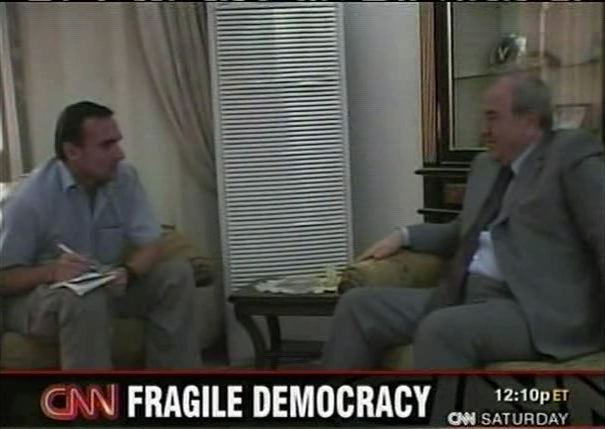LS: Fragile Democracy

Click photo to play
Length: 3:49
SUZANNE MALVEAUX: In Iraq, a fledgling government struggles under what can best be described as a fragile democracy. Earlier today in Baghdad, Prime Minister Nouri al-Maliki urged tribal leaders to unite and end the bloody sectarian violence that threatens to plunge the country into civil war. Our Michael Ware explores the dangers on the road to democracy.
(BEGIN VIDEOTAPE)
MICHAEL WARE, CNN CORRESPONDENT (voice-over): Car bombings, an ongoing guerilla war, sectarian slayings, and an ailing economy; the stakes couldn't be greater for the people of Iraq or for the Bush administration.
BUSH: A failed Iraq would make America less secure.
WARE: What's harder to see is the solution.
BUSH: The strategy is to help the Iraqi people achieve their objectives and their dreams which is a Democratic society.
UNIDENTIFIED MALE (through translator): No, there's no democracy at all because you can see the situation right now, from the killing, terrorism, looting.
WARE: If democracy is the answer, where is it at? According to America's closest political allies in Iraq, former Prime Minister Ayad Allawi, the new democracy was planted too quickly for it to take root.
AYAD ALLAWI, FORMER IRAQ PRIME MINISTER: No, it's not really a democracy.
WARE: Though Iraqis to the ballot box three times -- once amid violence, twice with the insurgent's approval -- Allawi insists the political process has stalled.
ALLAWI: Elections are not democracy. There are as lawlessness. There is no institutions, no -- even no judiciary institutions here that you can go and air your problems. Democracy is also about checks and balances, we don't have this at all.
WARE: He claims power is vested within shadowy groups within the government, with Iranian links and militia connections. U.S. officials say it's too soon to pass judgment on a fledgling state mired in war.
COL. DANA PITTARD, U.S. ARMY: It is an Iraqi style democracy, no one expected it to be an American style of democracy.
WARE: Death squads, terrorism and the influence of neighboring Iran are hurdles, U.S. military commanders and officials say, but the foundation stones are at least tentatively in place.
PITTARD: However, for this new Iraqi government to be able to have credibility, Baghdad must be stabilized.
WARE: A massive joint American and Iraqi operation is underway in the capital. Twenty-two raids against death squads, says a U.S. military spokesman, and 28,000 buildings have been cleared, with tens of thousands of troops entering one troubled district after another, curbing sectarian murders as they go.
A senior U.S. official says "Operation Together Forward" is the best way to help Iraq's new prime minister, a man without a militia of his own, counter the militias, many embedded within his government and undermining his authority. But Allawi, who worked on operations against Saddam for more than a decade, claims the U.S. plan will fail unless there is a major change of course, as more people lose faith as drift to the militias and the insurgency.
ALLAWI: Go, take any Iraqi at 8:00, ask him to go to a restaurant or go to move to see a relative.
WARE: A U.S. military spokesman says the coming weeks will tell if the Baghdad operation is truly working. There's a lot riding on it. President Bush sees the spread of democracy in the region as the solution to terrorism.
BUSH: I believe it's the challenge of this -- the challenge for this generation.
WARE: Many will be hoping, then, the nascent democracy in Iraq is better than it looks.
Michael Ware, CNN, Baghdad.
(END VIDEOTAPE)
